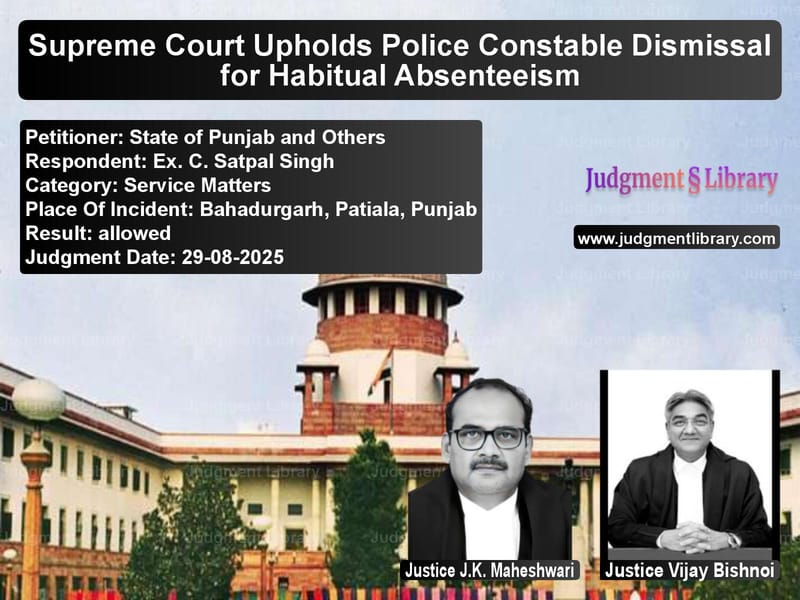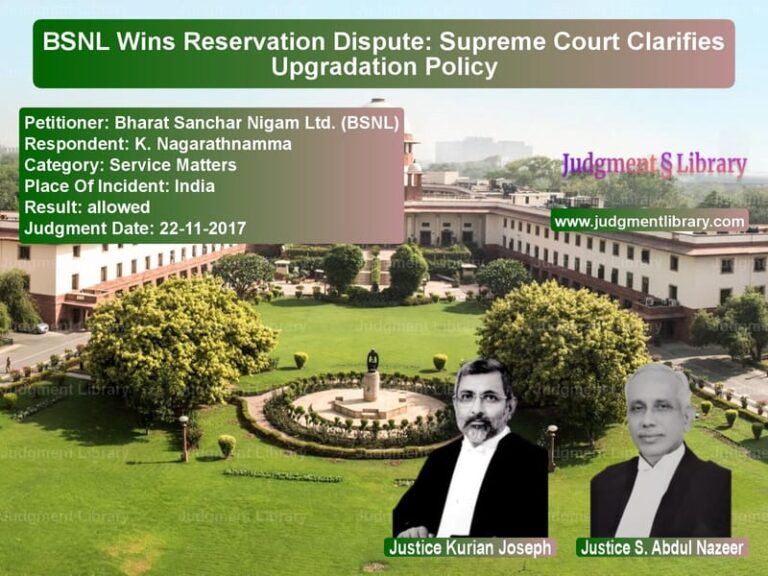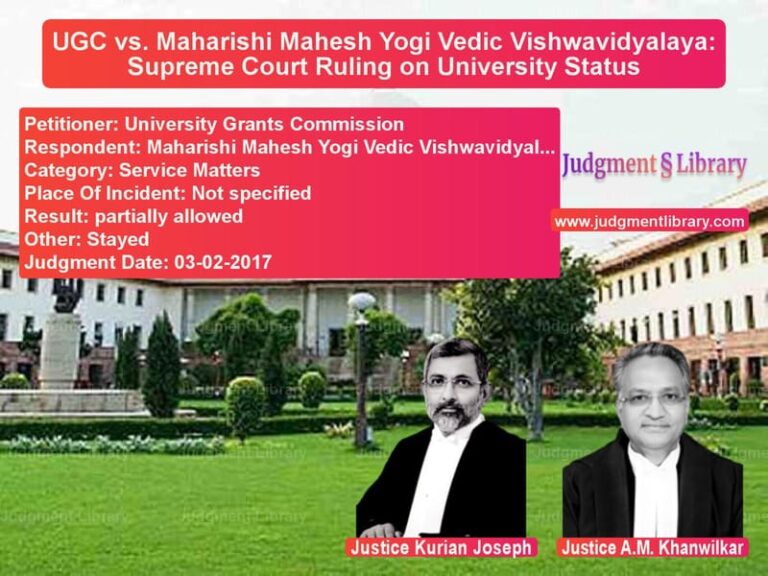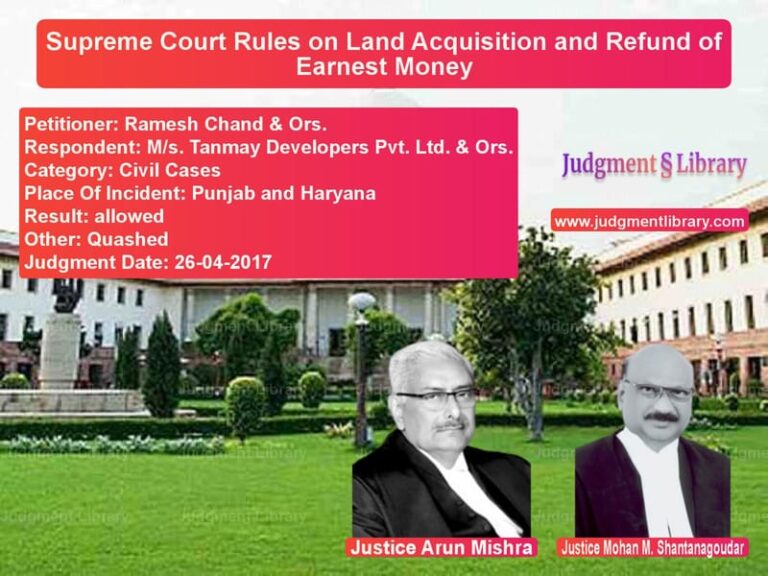Supreme Court Upholds Police Constable Dismissal for Habitual Absenteeism
In a significant judgment that reinforces the importance of discipline in police forces, the Supreme Court has upheld the dismissal of a constable for habitual absenteeism, setting aside the High Court’s order that had reinstated him. The case involved Ex. Constable Satpal Singh, who was dismissed from the Punjab Armed Forces after being found repeatedly absent from duty without authorization over a seven-year service period.
The respondent, Satpal Singh, was appointed as a Constable in the Punjab Armed Forces on August 4, 1989, and was later transferred to the Commando Force in 1992. The disciplinary proceedings that led to his dismissal stemmed from an incident in April 1994 when he applied for five days leave but was granted only one day. He proceeded on leave on April 2, 1994, but failed to resume his duties on April 4, 1994, returning only on May 12, 1994, resulting in an unauthorized absence of approximately 37 days.
During the arguments before the Supreme Court, the appellants (State of Punjab) contended that “the High Court has grossly erred in setting aside the judgment and decree passed by the Trial Court as well as the Appellate Court, whereby the suit filed by the respondent for declaration and mandatory injunction was dismissed.” They argued that “the dismissal order of the respondent was not based on the previous misconduct but was solely based on the misconduct for which the disciplinary enquiry was initiated against him.”
The appellants further submitted that “the reference of the previous conduct of the respondent in the dismissal order was only for adding the weight to the decision of imposing the punishment of dismissal.” They emphasized that “being a member of the disciplined force, the respondent remained absent for a considerably long period without seeking permission and even without informing, and therefore, in the facts and circumstances of the case, the punishment of dismissal from service cannot be said to be illegal in any manner.”
On the other side, the respondent’s counsel argued that “the High Court had not committed any illegality in passing the impugned order because the disciplinary authority while inflicting the punishment of dismissal had relied upon the past misconduct of the respondent without disclosing the same in the show cause notice.” They relied on the precedent set in K. Manche Gouda’s case, which requires that if past conduct is to be considered for punishment, it must be disclosed to the employee.
The Supreme Court, in its detailed analysis, examined the entire service record of the respondent and found that he had a history of absenteeism. The court noted that “the respondent remained absent from duties for the following periods: From 04.06.1993 to 11.08.1993 (for 68 days), From 06.09.1993 to 04.03.1994 (for 180 days), From 12.12.1993 to 04.01.1994 (for 20 days) and lastly, he remained absent from 04.04.1994 to 12.05.1994 (37 days).”
The court extensively discussed the legal position regarding consideration of past conduct in disciplinary matters. It referred to the landmark case of India Marine Services Private Ltd., where it was held that “It is true that the last sentence suggests that the past record of Bose has also been taken into consideration. But it does not follow from this that that was the effective reason for dismissing him. The Managing Director having arrived at the conclusion that Bose’s services must be terminated in the interest of discipline, he added one sentence to give additional weight to the decision already arrived at.”
The Supreme Court also relied on its judgment in Union of India vs. Bishamber Das Dogra, where it was observed that “it is desirable that the delinquent employee may be informed by the disciplinary authority that his past conduct would be taken into consideration while imposing the punishment. But in case of misconduct of grave nature or indiscipline, even in the absence of statutory rules, the authority may take into consideration the indisputable past conduct/service record of the employee for adding the weight to the decision of imposing the punishment if the facts of the case so require.”
The court made a crucial distinction in interpreting Rule 16.2(1) of the Punjab Police Rules, 1934, which states: “Dismissal shall be awarded only for the gravest acts of misconduct or as the cumulative effect of continued misconduct proving incorrigibility and complete unfitness for police service. In making such an award regard shall be had to the length of service of the offender and his claim to pension.”
The Supreme Court explained that “Rule 16.2(1) consists of two parts, the first part where the punishment of dismissal can be awarded to the delinquent for the gravest act of misconduct. However, in the second part, the punishment can be awarded as a cumulative effect of continued misconduct proving incorrigibility and complete unfitness for police service.” The court clarified that “While imposing punishment for such continued misconduct proving incorrigibility and complete unfitness for police service, the length of service of the offender is required to be taken into consideration, which is missing in the case of the first part of Rule 16.2(1).”
In its concluding observations, the Supreme Court held that “the reference to the fact of forfeiture of 17 years of service of the respondent as a result of his absence from service on previous occasions was in exclusion or independent of the misconduct for which the enquiry officer has found him guilty. The consideration of the past misconduct of the respondent was not the effective reason for dismissing him from the service. The disciplinary authority had mentioned the past misconduct of the respondent only for adding the weight to the decision of imposing the punishment.”
The court further noted that “In the facts of the present case, it is clear that the respondent was dealt by the department earlier on three occasions having remained absent from duty and the penalties were inflicted for the same. It is the fourth time when he remained absent to which, a chargesheet was issued and his guilt was found proved.”
The Supreme Court emphasized the importance of discipline in police forces, stating that “The respondent was appointed as a constable in the Punjab Armed Forces and then transferred to the Commando Force, which is a disciplined force.” The court found that “the absence of the respondent from the duty on various occasions in a short tenure of service of around 7 years, is a gross indiscipline on the part of the respondent.”
Ultimately, the Supreme Court allowed the appeal and set aside the High Court’s judgment, restoring the dismissal order. The court concluded that “the dismissal of the respondent was based on gravest act of misconduct, for which he was dealt with by the disciplinary authority following the procedure as prescribed and in due observance of principles of natural justice, hence, we do not find any fault in the same.”
This judgment serves as an important precedent for disciplinary matters in police forces and other disciplined services, clarifying when past conduct can be considered in imposing punishment and interpreting the nuanced provisions of Rule 16.2(1) of the Punjab Police Rules. The Supreme Court’s decision reinforces that habitual absenteeism, especially in disciplined forces, constitutes grave misconduct warranting dismissal, and that procedural requirements must be balanced against the need to maintain discipline in essential services.
Petitioner Name: State of Punjab and Others.Respondent Name: Ex. C. Satpal Singh.Judgment By: Justice J.K. Maheshwari, Justice Vijay Bishnoi.Place Of Incident: Bahadurgarh, Patiala, Punjab.Judgment Date: 29-08-2025.Result: allowed.
Don’t miss out on the full details! Download the complete judgment in PDF format below and gain valuable insights instantly!
Download Judgment: state-of-punjab-and-vs-ex.-c.-satpal-singh-supreme-court-of-india-judgment-dated-29-08-2025.pdf
Directly Download Judgment: Directly download this Judgment
See all petitions in Termination Cases
See all petitions in Disciplinary Proceedings
See all petitions in Employment Disputes
See all petitions in Public Sector Employees
See all petitions in Workplace Harassment
See all petitions in Judgment by J.K. Maheshwari
See all petitions in Judgment by Vijay Bishnoi
See all petitions in allowed
See all petitions in supreme court of India judgments August 2025
See all petitions in 2025 judgments
See all posts in Service Matters Category
See all allowed petitions in Service Matters Category
See all Dismissed petitions in Service Matters Category
See all partially allowed petitions in Service Matters Category







